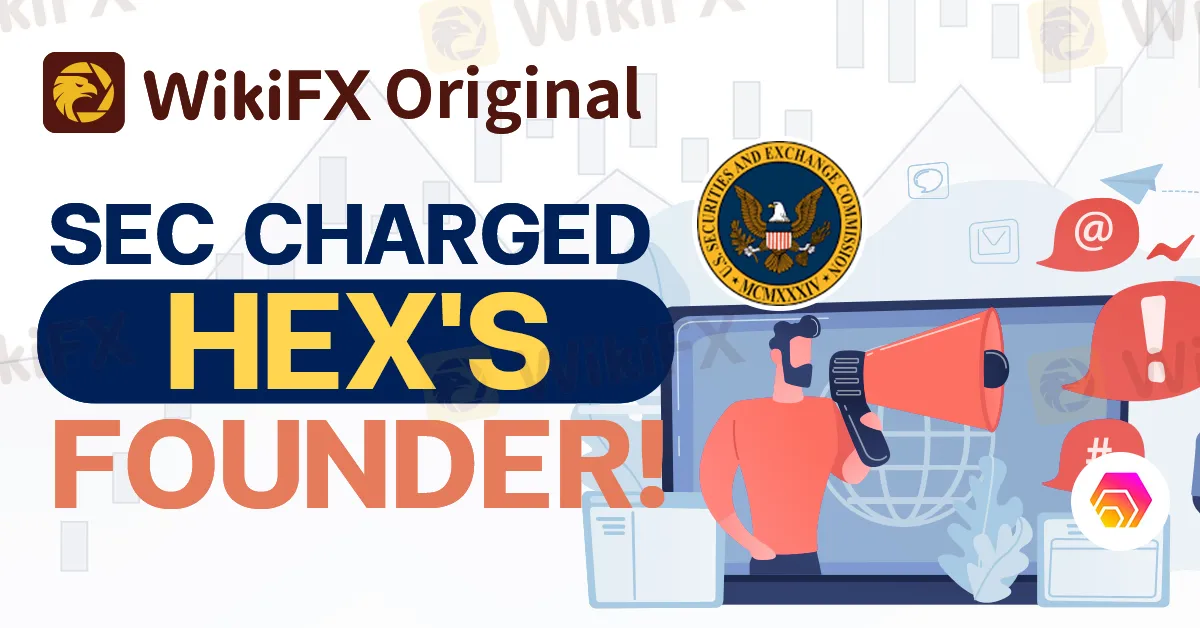简体中文
繁體中文
English
Pусский
日本語
ภาษาไทย
Tiếng Việt
Bahasa Indonesia
Español
हिन्दी
Filippiiniläinen
Français
Deutsch
Português
Türkçe
한국어
العربية
SEC Charged HEX’s Founder
Abstract:The US Securities and Exchange Commission (SEC) has charged Hex's Founder, Richard Heart, for allegedly raising over $1 billion through unregistered offerings of crypto asset securities, marking the latest move in the regulator's crackdown on crypto exchanges in the United States.

The Securities and Exchange Commission (SEC) in the United States has escalated its crackdown on crypto exchanges, with charges being filed against Richard Heart, also known as Richard Schueler, the Founder of Hex, for allegedly raising more than $1 billion through unregistered offerings of crypto asset securities. The charges were brought before a New York district court.


According to the SEC, Heart initiated the fundraising for Hex in 2018, marketing it as the first high-yield “blockchain certificate of deposit.” He is also accused of raising funds for PulseChain, an alleged crypto asset network, and PulseX, the associated crypto asset trading platform.
The SEC asserts that all three entities, Hex, PulseChain, and PulseX, are under Heart's control. He is accused of offering investors the exchange of their digital assets for PLS and PLSX, the native tokens of PulseChain and PulseX.
The complaint claims that from December 2019 to November 2020, Heart and Hex conducted an unregistered offering of Hex tokens, collecting over 2.3 million Ethereum (ETH), including through “recycling” transactions that allowed Heart to gain control of more Hex tokens secretly. The SEC also alleges that between July 2021 and March 2022, Heart orchestrated two additional unregistered crypto asset security offerings, raising hundreds of millions of dollars more in crypto assets.
Furthermore, the SEC accuses Heart and PulseChain of misappropriating at least $12 million of investor funds, which Heart reportedly spent on luxury items such as sports cars, watches, and even a 555-carat black diamond known as “The Enigma,” reputedly the world's largest black diamond.
Heart also promoted a “staking” feature for Hex tokens, claiming they would provide returns of up to 38%. Additionally, in an attempt to evade US securities law, Heart allegedly urged investors to “sacrifice” their crypto assets instead of “investing” them in exchange for PLS and PLSX.
Eric Werner, Director of the SEC's Fort Worth Regional Office, stated that the action seeks to protect investors and hold Heart accountable for his actions.
The SEC's actions against Heart and his companies are part of its ongoing legal battle against Binance and Coinbase, two major crypto platforms accused of offering unregistered crypto asset securities. The SEC also accused Binance of mixing client funds with company resources.
In contrast, Ripple, a digital asset firm, secured a partial victory against the SEC earlier this month when a US court ruled that the token sale of XRP to retail investors on public exchanges did not violate US securities law.

Disclaimer:
The views in this article only represent the author's personal views, and do not constitute investment advice on this platform. This platform does not guarantee the accuracy, completeness and timeliness of the information in the article, and will not be liable for any loss caused by the use of or reliance on the information in the article.
Read more

Bybit Shuts Down NFT Marketplace Amid Crypto Market Downturn
Bybit announces the closure of its NFT marketplace, citing efforts to streamline offerings. Discover the latest trends in the declining NFT market and its shift to utility-based growth.

Galaxy Digital Settles $200M in Luna Token Manipulation Case
Galaxy Digital pays $200M to settle Luna token manipulation probe by NY regulators, linked to TerraUSD’s 2022 crash, impacting crypto market stability.

Vanuatu Passes VASP Act to Regulate Crypto and Digital Assets
Vanuatu's new VASP Act regulates crypto businesses, enforcing strict licensing, AML/CFT compliance, and investor protections.

Blockchain Decentralization: Empowering a Trustless Future
In recent years, blockchain technology has rapidly evolved from a niche innovation behind Bitcoin into a transformative force across industries. At its core, blockchain decentralization refers to the distribution of authority and decision-making away from a central entity and into the hands of a distributed network of participants. This shift redefines how data is stored and verified and paves the way for trustless, transparent, and resilient systems that challenge traditional centralized models.
WikiFX Broker
Latest News
The Withdrawal Trap: How Scam Brokers Lure Victims into Paying More
FCA to Investors: Think Twice Before Trusting These Brokers
Trump\s tariffs: How could they affect the UK and your money
Trump gambles it all on global tariffs he\s wanted for decades
TradingView Brings Live Market Charts to Telegram Users with New Mini App
Trump tariffs: How will India navigate a world on the brink of a trade war?
Interactive Brokers Launches Forecast Contracts in Canada for Market Predictions
Authorities Alert: MAS Impersonation Scam Hits Singapore
IG Group Acquires Freetrade for £160M to Expand UK Investment Market
U.S. March ISM Manufacturing PMI Released
Currency Calculator







